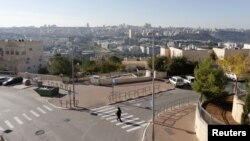JERUSALEM —
Palestinian leaders are reacting with anger to Israel's announcement that it intends to move ahead with the construction of hundreds of homes for Jews on East Jerusalem land that is claimed by the Palestinians.
Palestinian leaders on Tuesday protested the Israel government's final approval of the construction of 1,500 new homes in the Jewish area of Ramat Shlomo in East Jerusalem.
A spokesman for the Fatah movement, Ahmed Assaf, said the move violated international law and amounted to war crimes.
He said nobody in the world recognizes this Israeli decision. It will be opposed by Palestinians and on the political level will push Palestinians to the International Court of Justice.
Israeli construction of new housing in Jerusalem can take years because of the number of hearings and approvals needed before the land can be cleared.
The building plans for Ramat Shlomo were first revealed by Israel two years ago during a visit by U.S. Vice-President Joe Biden. The announcement took the U.S. government aback and caused sharp condemnation from Washington.
The Israeli government announced plans earlier this month to build several thousand homes in other settlements in the West Bank and East Jerusalem.
Palestinian and Israeli critics say this construction would create a buffer of Jewish districts around East Jerusalem, which both sides claim. It also would effectively sever land links between the northern West Bank, including Ramallah, and the southern West Bank, which includes Bethlehem.
Israeli supporters of the settlement expansion say special roads and tunnels could be built to connect the two Palestinian cities.
A spokesman for Israeli Prime Minister Benjamin Netanyahu, Ofer Geldman, said the government never said it would not build in neighborhoods in what he called the Israeli capital.
He said this decision does not change anything on the ground. If the Palestinians want to reach a solution to this problem, he said, why do they not return to the negotiating table?
The Palestinians have refused to resume peace talks with Israel as long as it continues settlement construction in the West Bank and East Jerusalem. The international community considers the construction illegal, a position that Israel rejects.
Israel announced the latest settlement expansion plans last month after the U.N. General Assembly voted overwhelmingly to upgrade the Palestinian Authority status at the world body to that of non-member observer state.
The Palestinians view this as international recognition of their long-desired state. Israel fears the new status would allow the Palestinians to access U.N. institutions, such as the International Court of Justice.
Palestinian leaders on Tuesday protested the Israel government's final approval of the construction of 1,500 new homes in the Jewish area of Ramat Shlomo in East Jerusalem.
A spokesman for the Fatah movement, Ahmed Assaf, said the move violated international law and amounted to war crimes.
He said nobody in the world recognizes this Israeli decision. It will be opposed by Palestinians and on the political level will push Palestinians to the International Court of Justice.
Israeli construction of new housing in Jerusalem can take years because of the number of hearings and approvals needed before the land can be cleared.
The building plans for Ramat Shlomo were first revealed by Israel two years ago during a visit by U.S. Vice-President Joe Biden. The announcement took the U.S. government aback and caused sharp condemnation from Washington.
The Israeli government announced plans earlier this month to build several thousand homes in other settlements in the West Bank and East Jerusalem.
Palestinian and Israeli critics say this construction would create a buffer of Jewish districts around East Jerusalem, which both sides claim. It also would effectively sever land links between the northern West Bank, including Ramallah, and the southern West Bank, which includes Bethlehem.
Israeli supporters of the settlement expansion say special roads and tunnels could be built to connect the two Palestinian cities.
A spokesman for Israeli Prime Minister Benjamin Netanyahu, Ofer Geldman, said the government never said it would not build in neighborhoods in what he called the Israeli capital.
He said this decision does not change anything on the ground. If the Palestinians want to reach a solution to this problem, he said, why do they not return to the negotiating table?
The Palestinians have refused to resume peace talks with Israel as long as it continues settlement construction in the West Bank and East Jerusalem. The international community considers the construction illegal, a position that Israel rejects.
Israel announced the latest settlement expansion plans last month after the U.N. General Assembly voted overwhelmingly to upgrade the Palestinian Authority status at the world body to that of non-member observer state.
The Palestinians view this as international recognition of their long-desired state. Israel fears the new status would allow the Palestinians to access U.N. institutions, such as the International Court of Justice.




